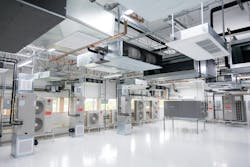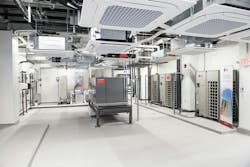Beyond the Classroom: Training to Build Careers and Retain Talent
Key Highlights
- Workforce shortages in HVAC are driven by retirements surpassing new industry entrants, emphasizing the need for strategic training investments.
- Advanced LMS platforms enable personalized learning paths, helping technicians develop specialized skills and advance their careers.
- Training academies across the U.S. and online offerings are expanding access to quality HVAC education for both new and experienced professionals.
The skilled trades are experiencing significant workforce challenges.
In fact, according to Bloomberg, industry trends indicate an environment where retirements outpace new entrants into the workforce.
The HVAC industry, which plays a crucial role in modern comfort, is certainly not immune to the demographic shift.
But this issue isn't merely a recruitment problem; it's a critical imperative for retention and development. In today's fiercely competitive and understaffed landscape, investing in employee development, particularly through structured training, has become increasingly important from a strategic perspective.
This investment serves as the foundation for building a more skilled workforce, while also supporting engagement among contractors already in-house by fostering loyalty and enhancing job satisfaction. This is why HVAC manufacturers are now stepping up, developing comprehensive training programs better tailored to support their contractor partners and internal stakeholders.
These initiatives allow employers to invest directly in their teams, nurturing increased employee satisfaction and professional growth. In turn, this creates a workplace where employees are more likely to stay and succeed in the long term.
What Keeps Them: The Training Technicians Crave
Feedback across the industry paints a clear picture: both employers and employees are seeking a broader and deeper range of training.
Traditionally, training programs focused heavily on product introductions and basic installations. However, there's now a significant demand for more comprehensive service training and more advanced content.
This evolution reflects the increasing complexity of modern HVAC systems and the undeniable need for technicians to possess a broader and more in-depth skill set to effectively diagnose, maintain, and repair.
Employers often look for efficient training options that minimize classroom time. The ideal scenario involves attendees traveling to a single, comprehensive course that covers all necessary aspects — from installation and startup to servicing equipment — at an intermediate level. This scenario would address the high costs associated with fragmented training approaches of the past, which included travel expenses, accommodation, and the significant loss of productive work time while employees were away from their jobs.
The Learning Blueprint: Empowering Success
Employees today are seeking workplaces that offer clear pathways for professional growth, and forward-thinking employers are eager to cultivate a highly skilled and engaged workforce. A practical approach can be found in guided learning programs.
Leading HVAC manufacturers, for instance, are now leveraging advanced Learning Management Systems (LMS) to revolutionize employee development. These platforms help employers to gain invaluable insights into their team's capabilities, offering a comprehensive overview of completed courses and areas of proficiency.
More importantly, LMS allows employers to assign tailored training curricula, ensuring each employee receives the precise education needed to advance their career.
For the ambitious service technician, for example, programmatic learning can help generate a personalized development roadmap. If their goal is to become a master technician or specialize in a new product line, the LMS will recommend a specific sequence of courses, from foundational knowledge like advanced refrigeration to specialized product training.
These programs help remove guesswork, aiming to ensure that training time contributes to the employee’s professional growth. The result can be a workforce that feels supported, which may improve job satisfaction and loyalty, as employees see how their learning directly translates into tangible career progression.
The strategic implementation of tailored learning extends beyond individual career paths, fostering a more agile and competent organization. The approach of training employees and contractors empowers both sides of the employment equation.
By proactively identifying skill gaps and recommending targeted interventions, companies can ensure their teams are always equipped with the latest knowledge and techniques, minimizing costly callbacks and maximizing efficiency.
The commitment to continuous, relevant development may not only foster a highly proficient workforce but also reinforce a culture of growth and excellence, making the company a more attractive employer and a more formidable competitor in the marketplace.
Recognizing the industry's demand for more proficient specialists, LG is investing in the development of training academies across the United States. These academies help bring training to an increasing number of professionals and aim to elevate the education of the upcoming wave of contractors while empowering existing experts to hone their skills and deepen their knowledge of new HVAC technologies. This also includes five training academies and 59 associate academies across the country and online training offerings for professionals who are unable to attend in person.
Nurturing New Talent: Bridging the Skills Gap
The recruitment shortage in today’s HVAC industry is particularly challenging when it comes to those entering the workforce directly from high school or vocational programs, where limited exposure to specialized technical training can leave new hires feeling unprepared and less confident as they begin their careers.
To address this, forward-thinking manufacturers are developing “fundamental series” training programs designed to bridge the gap between basic education and the specific demands of the job. These trainings offer comprehensive instruction in core principles, such as basic electricity, refrigeration, electrical troubleshooting skills, and more.
By providing essential foundational knowledge, employers are equipping new hires with essential skills while also demonstrating a meaningful investment in their long-term success.
Early commitment to career development acts as a powerful motivator for professional success, signalling to young employees that they are valued assets with clear pathways for growth, which can help improve engagement and reduce early-career turnover.
Continued investment in training is an important factor in supporting the HVAC industry and supporting the next generation of tradespeople. Imparting the skills and confidence they need to succeed ensures the industry remains strong, competitive, and ready to meet the ever-growing heating and cooling demands for residential and commercial applications.
About the Author

Mark Rogers
Mark Rogers is the director of Aftermarket Solutions at LG Air Conditioning Technologies USA. Rogers leverages his extensive expertise in VRF and Ductless Mini-Split systems to drive enhanced customer experiences by implementing customer-centric strategies and fostering a culture of continuous improvement.

